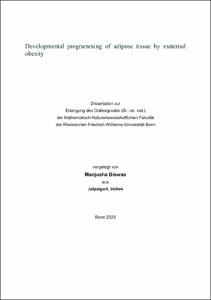Biswas, Manjusha: Developmental programming of adipose tissue by maternal obesity. - Bonn, 2024. - Dissertation, Rheinische Friedrich-Wilhelms-Universität Bonn.
Online-Ausgabe in bonndoc: https://nbn-resolving.org/urn:nbn:de:hbz:5-75566
Online-Ausgabe in bonndoc: https://nbn-resolving.org/urn:nbn:de:hbz:5-75566
@phdthesis{handle:20.500.11811/11445,
urn: https://nbn-resolving.org/urn:nbn:de:hbz:5-75566,
doi: https://doi.org/10.48565/bonndoc-253,
author = {{Manjusha Biswas}},
title = {Developmental programming of adipose tissue by maternal obesity},
school = {Rheinische Friedrich-Wilhelms-Universität Bonn},
year = 2024,
month = mar,
note = {Tissue-resident macrophages are an integral part of the innate immune system, but their biology is not well understood in the context of metabolic diseases. Distinctive Resident macrophage populations are identified in different organs in mice and humans using fate mapping studies. They develop from the yolk sac and self-maintain themselves lifelong in specific tissular niches. Adipose tissue is the largest endocrine organ of the body which also takes part in energy balance and metabolic homeostasis. Adipose tissue macrophages have recently gained attention for being the majority of immune cell type in steady state and metabolic imbalance and many studies are emerging to understand their mechanistic role in disease development. Adipose tissue-resident macrophages are the guardians of the immune metabolic gateway. However, the full spectrum of adipocyte and adipose resident macrophage interaction is still a matter of current research. Moreover, on the verge of the obesity pandemic, itis important to look beyond and try to understand the mechanism of transmission of metabolic disease to the next generation. Maternal obesity plays an important role in offspring’s metabolic life, but the role of adipose tissue macrophages in this regard is uncharted territory. Here, we have shown using mouse models that maternal obesity leads to reprogramming of adipose tissue by adipose tissue macrophages in the offspring. The reprogrammed adipose tissue microenvironment showed adipocyte hypertrophy and increased crown-like structure formation in maternal obese pups as delineated by histopathology. Moreover, the gonadal adipose tissue was marked by infiltration of ontogenically diverse macrophage subsets as shown by high dimensional flow cytometry data. These macrophages were primed by specific immune- metabolic signaling aberrations like HIF-1a and MYD88, Moreover, these maternal obese pups also showed delayed sensitivity to insulin in insulin tolerance tests and aberrant lipid subclasses in the lipidomic profile. These adverse effects were observed to be rescued using myeloid lineage-specific knock-out mice. It confirmed the role of adipose tissue macrophages in the pathogenesis of maternal obesity-induced reprogramming of offspring adipose tissue.Our findings indicate that maternal obesity is responsible for the transmission of adverse metabolic signatures to the offspring’s adipose tissue and provide evidence that ontogenically heterogeneous macrophages are responsible for such metabolic aberration.},
url = {https://hdl.handle.net/20.500.11811/11445}
}
urn: https://nbn-resolving.org/urn:nbn:de:hbz:5-75566,
doi: https://doi.org/10.48565/bonndoc-253,
author = {{Manjusha Biswas}},
title = {Developmental programming of adipose tissue by maternal obesity},
school = {Rheinische Friedrich-Wilhelms-Universität Bonn},
year = 2024,
month = mar,
note = {Tissue-resident macrophages are an integral part of the innate immune system, but their biology is not well understood in the context of metabolic diseases. Distinctive Resident macrophage populations are identified in different organs in mice and humans using fate mapping studies. They develop from the yolk sac and self-maintain themselves lifelong in specific tissular niches. Adipose tissue is the largest endocrine organ of the body which also takes part in energy balance and metabolic homeostasis. Adipose tissue macrophages have recently gained attention for being the majority of immune cell type in steady state and metabolic imbalance and many studies are emerging to understand their mechanistic role in disease development. Adipose tissue-resident macrophages are the guardians of the immune metabolic gateway. However, the full spectrum of adipocyte and adipose resident macrophage interaction is still a matter of current research. Moreover, on the verge of the obesity pandemic, itis important to look beyond and try to understand the mechanism of transmission of metabolic disease to the next generation. Maternal obesity plays an important role in offspring’s metabolic life, but the role of adipose tissue macrophages in this regard is uncharted territory. Here, we have shown using mouse models that maternal obesity leads to reprogramming of adipose tissue by adipose tissue macrophages in the offspring. The reprogrammed adipose tissue microenvironment showed adipocyte hypertrophy and increased crown-like structure formation in maternal obese pups as delineated by histopathology. Moreover, the gonadal adipose tissue was marked by infiltration of ontogenically diverse macrophage subsets as shown by high dimensional flow cytometry data. These macrophages were primed by specific immune- metabolic signaling aberrations like HIF-1a and MYD88, Moreover, these maternal obese pups also showed delayed sensitivity to insulin in insulin tolerance tests and aberrant lipid subclasses in the lipidomic profile. These adverse effects were observed to be rescued using myeloid lineage-specific knock-out mice. It confirmed the role of adipose tissue macrophages in the pathogenesis of maternal obesity-induced reprogramming of offspring adipose tissue.Our findings indicate that maternal obesity is responsible for the transmission of adverse metabolic signatures to the offspring’s adipose tissue and provide evidence that ontogenically heterogeneous macrophages are responsible for such metabolic aberration.},
url = {https://hdl.handle.net/20.500.11811/11445}
}






